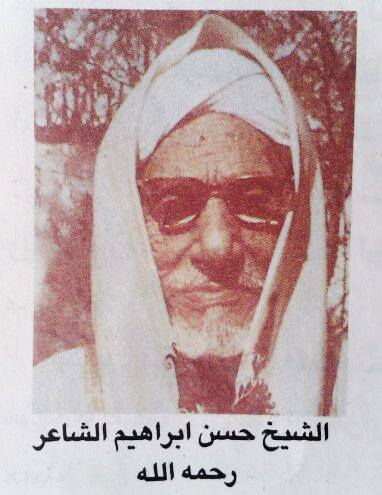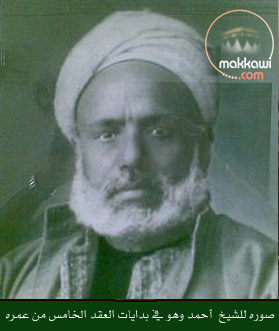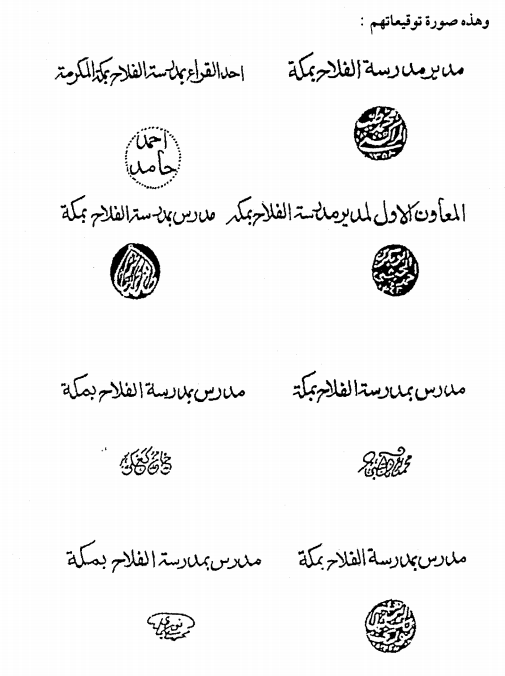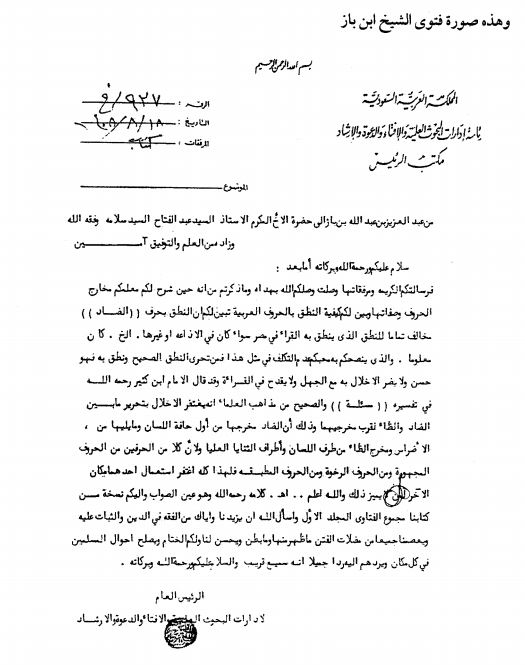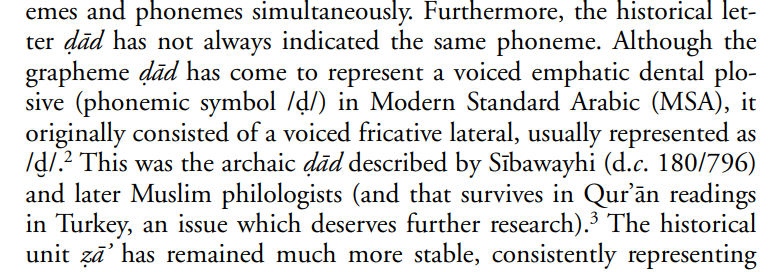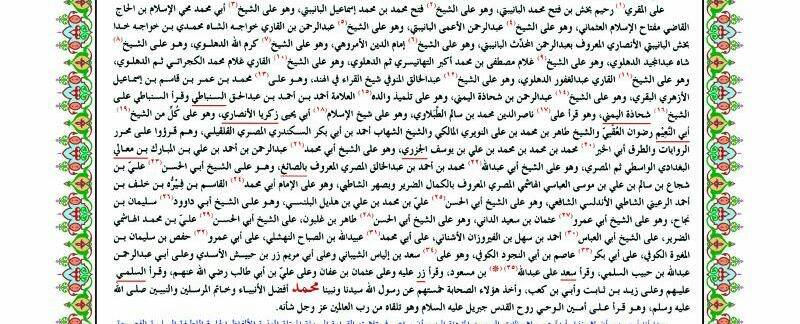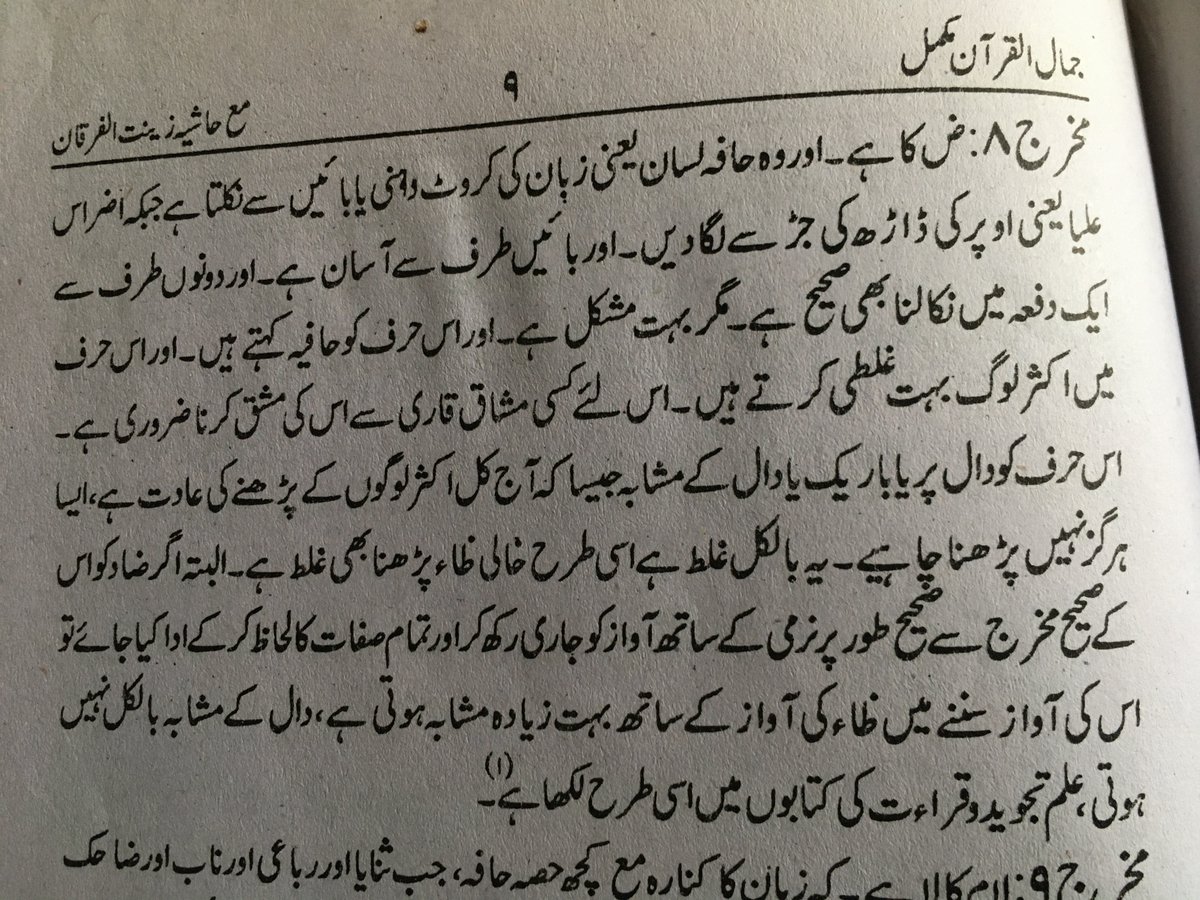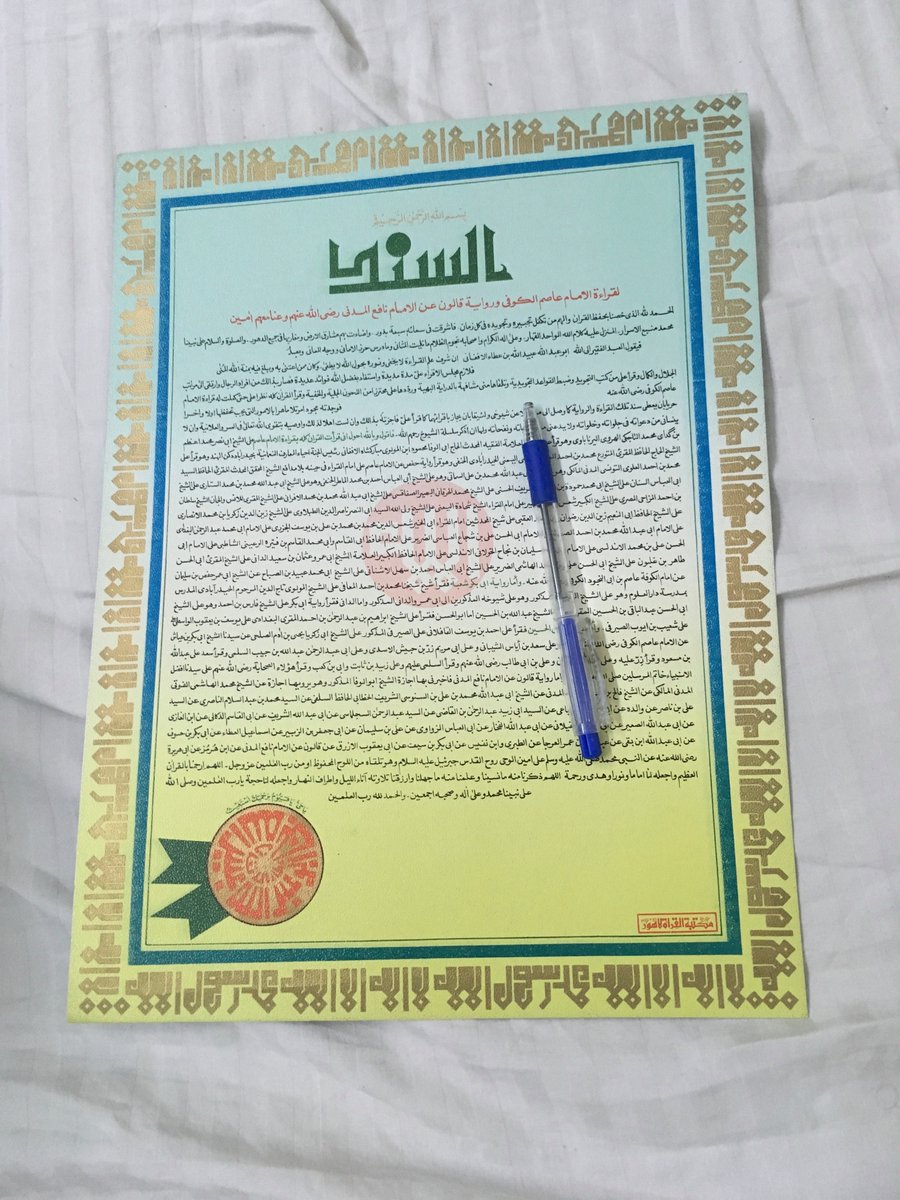Part 4 (last one) of the ض series. This thread is tailored for traditional students/teachers of Tajwīd like myself who are concerned with the preservation of Tajwīd through talaqqī (unbroken oral transmission). I will show how the original ض survives among scholars of isnād today
In the beginning of my first thread on this series, I briefly touched upon the Uṣūl of Tajwīd and why theory is so important (sometimes at the expense of talaqqī if they clash). Nevertheless, like the classical Muslim scholars, I believe talaqqī is extremely vital to tradition.
In this thread, I present a list of recent and contemporary scholars (20th century - present) who don& #39;t agree w/ the modern د-like ض, and instead recite (or attempt to recite) the original proto-ض. Some demonstrate it only through recitation, while others openly advocate proto-ض
At some point during the early 20th century, some individuals requested rulings from the Qurrā& #39; of Medina and Makkah for the correct pronunciation of ض. They asked whether it was closer to the sound of the د or the ظ.
The response from the Qurrā& #39; of Medina was written by Shaykh Hassan ibn Ibrahim ash-Shaʿir (d.1400AH), who was a prestigious teacher of Tajwīd at Masjid an-Nabawi and occasionally led prayers there in the absence of the Imam. He studied in Egypt and later migrated to Medina.
He wrote that ض should only resemble ظ. If it resembles د or another letter (apparently some were adding غ to the mix) then it is incorrect. He adds that whoever prays behind an Imam who believes the ض resembles د (like the pronunciation today) then the prayer of both is invalid
The response from the Qurrā& #39; of Makkah was written by Ahmad Hāmid at-Tījī (d. 1368AH), who was known as the Shaykh of Qurrā& #39; in Hijāz. It was approved and signed by several other Makkan Qurrā& #39;.
He wrote that if one were to pronounce the ض correctly from its proper point of articulation while fulfilling all of its characteristics (see my first thread), then the resulting correct sound will resemble ظ. As for any pronunciation that resembles د, it is far from correct.
A Qāri named as-Sayyid Abd-ul-Fattah as-Sayyid Salamah from Egypt took it upon himself to interview and record (on cassette tapes) as many Arab Qurrā& #39; as possible regarding this letter. Some of these recordings can be found on this youtube channel https://www.youtube.com/user/5454545442/videos">https://www.youtube.com/user/5454...
The most notable of those he interviewed in my opinion is one of the most renowned Qurrā& #39; of the 20th century: Shaykh ʿAli Shahhātah as-Samannudī (d1429AH). Many notable reciters studied with him including Mishary al-Afasy, Abdul Basit, Husari, Minshawi, Dr. Aymen Swaid, and more
They all valued his expertise and sought his ijāzāh, yet none of the above reciters wanted to take his ض pronunciation (a clear example of how ijāzah does not necessarily mean an accurate imitation of the teacher). He also did not force them to pronounce ض...
...like him, probably due to the political danger he would be in if he pushed too hard (see Part 3 of this series). Nevertheless, he did try to openly advocate for the ظ-like pronunciation, confirmed that he received it from some of his elders, and considered it the correct one.
Sadly, near the end of his life, when he was extremely old and frail both physically and mentally, he was constantly hassled and pressured by other contemporaries and even his own students to say (under duress) that he did not receive it from any teacher and instead made it up.
Another renowned Egyptian Qari, Abd-ul-Haleem Badr, states that the ض today is nothing but an emphatic د and it invalidates prayer. The true ض is close to ظ in sound. Listen to him here. https://www.youtube.com/watch?v=s5kNJgIpx-A">https://www.youtube.com/watch...
Abd-ul-Fattah Salamah mentions several more recent scholars that he or others interviewed who all agree that the ض should be closer to ظ and not at all close to the sound of د. The rest of them can be viewed here on pages 79-81 https://ia802905.us.archive.org/8/items/alfirdwsiy2018_gmail_1674/%D8%AA%D9%86%D8%A8%D9%8A%D9%87%20%D8%A7%D9%84%D8%B9%D8%A8%D8%A7%D8%AF%20%D8%A5%D9%84%D9%89%20%D9%83%D9%8A%D9%81%D9%8A%D8%A9%20%D8%A7%D9%84%D9%86%D8%B7%D9%82%20%D8%A8%D8%A7%D9%84%D8%B6%D8%A7%D8%AF%20%20%D9%83%D8%AA%D8%A7%D8%A8%20%20%20%D8%A7%D9%82%D8%B1%D8%A7%20%20%D8%A7%D9%88%D9%86%D9%84%D8%A7%D9%8A%D9%86%20%201674.pdf">https://ia802905.us.archive.org/8/items/a...
Though I’m really not a fan of the Salafi tradition, it would be remiss of me not to give credit to some notable Salafi scholars who also agreed that the modern ض is incorrect and it should actually resemble ظ.
His expertise in Hadīth is controversial, but Shaykh al-Albāni did have a sanad in Tajwīd and the recitation of Hafs through his father. He mentions in the following video that the modern ض is nothing but the “Egyptian ض” that resembles د. https://www.youtube.com/watch?v=oIittE83_5A">https://www.youtube.com/watch...
The correct ض, according to him, is that which resembles ظ. He also mentions that he wrote a treatise on ض at a young age and it was approved by another renowned Qari.
Another renowned Salafi scholar, Abdul Aziz bin Bāz, wrote a fatwa confirming the similarity between ض and ظ, and stating that the ض recited by the Qurrā of Egypt was contrary to what’s correct.
Among contemporary reciters, we find that some used to recite the original ض and have since changed the way they pronounce it, usually due to the pressure of conforming to modern majority.
It is claimed that the Imam of the Haram, Saud Shuraim, used to pronounce the ظ-like ض very early on and was later instructed and convinced to change it. The quality of the following recording is terrible, but you can kindaaa hear a rikhwah? Your call. https://www.youtube.com/watch?v=KBp7EIuth3g">https://www.youtube.com/watch...
The same is claimed about another Imam of the Haram, Muhammad Sabeel, who also later changed it. There is supposedly evidence in the following recording, but again, the quality is so bad it’s inconclusive https://www.youtube.com/watch?v=oRKuV7WH3tA">https://www.youtube.com/watch...
The Imam of Masjid an-Nabawi, Ali al-Hudhaify, notably used to recite the ظ-like ض as that was how he was taught. He later changed it to conform with the present-day majority. His disagreement about this issue with Qari Ubaydullah ibn Atā’ was well-known in Masjid an-Nabawi
Qari Muhammad ibn Yahya Sharīf al-Jazā’irī, well-known for his Tajwīd expertise, is a contemporary reciter who strongly advocates this pronunciation. He also compiled and edited one of the texts I’ve been referencing (تنبيه العباد). Here’s his recitation https://www.youtube.com/watch?v=hSzLXeeiO2k&t=699s">https://www.youtube.com/watch...
Dr. Jonathan Brown mentions that the original pronunciation of ض survives in asānīd in present-day Turkey. I’ve also heard a number of Turkish reciters deliberately pronounce the ظ-like ض.
Here’s one example I quickly found of a Turkish reciter pronouncing the original ض. http://www.assabile.com/ilhan-tok-107/ilhan-tok.htm
In">https://www.assabile.com/ilhan-tok... the previous threads, some of y’all posted some other reciters who also recite with the ظ-like ض, feel free to post those here as well!
In">https://www.assabile.com/ilhan-tok... the previous threads, some of y’all posted some other reciters who also recite with the ظ-like ض, feel free to post those here as well!
Finally, I’d like to discuss the Tajwīd/Qirā’āt tradition of the subcontinent. For some strange reason, the mastery of Tajwīd that scholars from the subcontinent possess is often overlooked or dismissed, perhaps even considered inferior. This could not be further from the truth.
I’ve been fortunate enough to have studied with several scholars of Tajwīd from the subcontinent whose asānīd usually go through Hijaz. Their mastery of Tajwīd theory is very clear in their detailed translations and commentaries of classical works.
One interesting subcontinental Qur’an tradition is that of the Pani-pattis. Their trademark is reciting nearly every verse in the same exact tone, claiming this helps w/ memorization. Presentday followers of this tradition are often known as Raheemi, in reference to their teacher
The ض in this tradition has been preserved as the original ظ-like sound. You can google panipatti or raheemi and find a plethora of recitations. Here’s one: https://www.youtube.com/watch?v=Wi_F_f16D8Y.">https://www.youtube.com/watch... Attached is their chain of transmission to the Prophet.
One of the most famous scholars to have ever graced the subcontinent, Maulana Ashraf Ali Thanwi (d. 1943 CE), was a master of the Qirā’āt. He mentions that the د-like pronunciation is completely incorrect, and that the correct ض sounds like ظ.
Maulana Rashid Ahmad Lundhyanwi (d. 2002), was another renowned scholar of the subcontinent. He wrote extensively about this issue in his book Ahsan-ul-Fatāwā. I translated an excerpt here: https://medium.com/@tulaibzafir/the-proper-pronunciation-of-the-letter-%D8%B6-53c99e5e9372">https://medium.com/@tulaibza...
Mufti Muhammad Shafi (d. 1976), father of renowned Mufti Taqi Usmani, wrote extensively on this issue as well in his book, Jawāhir-ul-Fiqh. He concluded that the correct pronunciation of ض is a ظ-like sound, and not د-like.
Maulana Shah Hakeem Akhtar (d. 2013) was another renowned scholar of tasawwuf in Pakistan. I was informed by his student that he was very strict about ض being pronounced as a sound similar to ظ and against the modern pronunciation.
One of my own sanads goes through what’s known as the Falāhī tradition, named after Qari Anīs Ahmad Khan (d.1990), teacher of Qirā’āt at Dar-ul-Ulum Falāh-e-Darayn in India. I confirmed with several of his direct students that until his death, he pronounced ض as resembling ظ...
It was only after his death that his successors and students later changed their pronunciations to conform. One of his students told me that when he migrated to the US, he became Imam at a masjid and pronounced ض the way he was taught by Qari Anīs. The Arab congregants at the…
...masjid did not approve of this pronunciation, and after many debates, threatened to remove him from his position. He told me that he, with immense regret, abandoned the pronunciation he was taught due to pressure from the Arabs of his local community.
The last one I will mention (though there are plenty of others) is Qari Muhammad Shareef (d. 1978), founder of Madrasat-ul-Qurrā’ in Lahore, Pakistan, author of Sabīl-ur-Rashād fī Tahqīqi Talaffudh aẓ-Ẓād, a fantastic book in Urdu in defense of the original ض.
After reading his book, in which he mentioned that he received the pronunciation of proto-ض through an unbroken chain, I tracked down his Madrasah and decided to visit. I was greeted by his sons and grandsons, who have since taken over the establishment.
They warmly welcomed me into their institution, and I had a long discussion with them about the issue of ض and other general Tajwīd issues. I then asked them if they knew of Qari Ubaydullah ibn Atā’ (who wrote Tanbīh-ul-’Ibād mentioned above) and they got super excited.
They told me that Qari Ubaydullah was a friend of their late father& had, on several occasions, visited them in the same room that I was in. They then found and showed me a copy of the Sanad of Qari Ubaydullah that he had gifted and exchanged w/ them in his last and final visit.
Before I left the Madrasah, I asked if I could recite to them and get their blessing for my pronunciation of ض according to their isnād, to which they agreed. I recited Surah Fatiha, Qiyāmah,& other verses to them, after which they gave me their blessing and ijāzah (tabarrukan)
Thus concludes my series of threads on ض. I hope it was informative! Special thanks to all of you who expanded on certain points. Again, this wasn’t meant to be super comprehensive, I simply wanted to bring certain points to light. For the sake of brevity, I left out some details
Please keep me in your du’as, prayers, wishes, thoughts, (letters of rec maybe? jk...unless)
اللهم صل وسلم وبارك على سيدنا محمد، وعلى آله وأصحابه أجمعين، وآخر دعونا أن الحمد لله رب العلمين
اللهم صل وسلم وبارك على سيدنا محمد، وعلى آله وأصحابه أجمعين، وآخر دعونا أن الحمد لله رب العلمين
Part 1: https://twitter.com/TheZaadFather/status/1194494405983391745?s=20
Part">https://twitter.com/TheZaadFa... 2: https://twitter.com/TheZaadFather/status/1194816685103964160?s=20
Part">https://twitter.com/TheZaadFa... 3: https://twitter.com/TheZaadFather/status/1197031340140417024?s=20">https://twitter.com/TheZaadFa...
Part">https://twitter.com/TheZaadFa... 2: https://twitter.com/TheZaadFather/status/1194816685103964160?s=20
Part">https://twitter.com/TheZaadFa... 3: https://twitter.com/TheZaadFather/status/1197031340140417024?s=20">https://twitter.com/TheZaadFa...

 Read on Twitter
Read on Twitter
